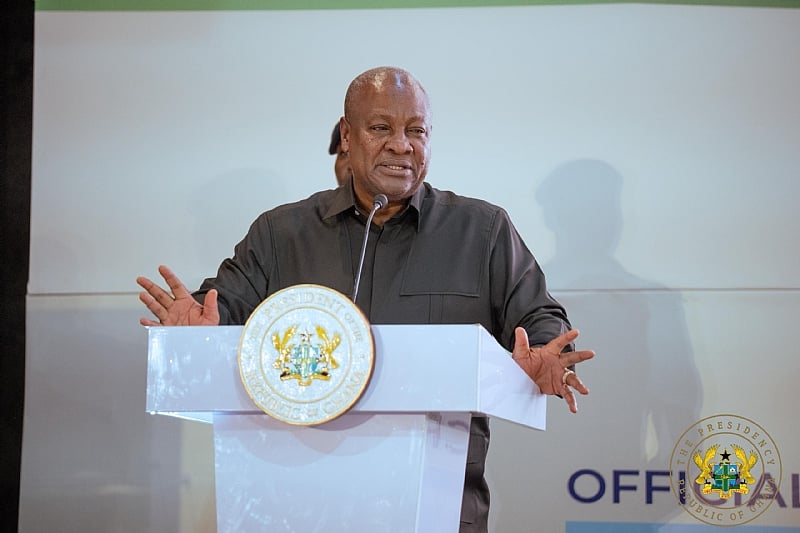Listen to the article
Ghana’s President Mahama Champions Fight Against Misinformation at UN Assembly
President John Dramani Mahama’s address at the 80th session of the United Nations General Assembly has drawn significant attention for his forceful stance on combating misinformation and hate speech in an increasingly digitalized world.
Speaking before the international body, Mahama highlighted several critical issues facing Africa, including the continent’s rightful representation on the Security Council and the transformative potential of its youth population. However, his remarks on the dangers of misinformation, disinformation, and political polarization have resonated particularly strongly with media professionals and digital rights advocates.
This isn’t the first time Mahama has addressed information disorder since taking office on January 7, 2025. In his inaugural speech, he specifically identified artificial intelligence as a double-edged sword, noting its potential to create “national, financial, and personal security issues that we cannot yet imagine,” including “misinformation and algorithm manipulation on social media platforms to sway a particular group’s sentiments.”
The president has consistently emphasized this concern in domestic forums as well. During a recent meeting with executives from the Ghana Journalists Association and at his first media encounter, Mahama revealed plans to track IP addresses of individuals spreading false information and to implement regulatory frameworks for bloggers and other new media practitioners.
These initiatives underscore the Ghanaian government’s recognition of digital misinformation as a serious national security threat. Recent months have seen multiple arrests related to online threats against government officials, journalists, and civil servants – a pattern that also occurred during former President Akufo-Addo’s administration.
The rapid technological transformation of information sharing presents unprecedented challenges. Social media platforms like TikTok and X (formerly Twitter) have become battlegrounds where misinformation and hate speech are weaponized to mislead and divide communities. The emergence of generative artificial intelligence has further complicated this landscape by dramatically lowering barriers to producing convincing fake content, including deepfake videos and AI-generated text that can be nearly indistinguishable from authentic communications.
Media and Information Literacy (MIL) experts argue that while regulatory approaches are necessary, they primarily address symptoms rather than root causes. Emmanuel Koranteng Asomani, a MIL trainer and advocate, suggests that building societal resilience requires a more fundamental solution: equipping citizens with the skills to access and critically assess information.
“As a country, our topmost priority should be teaching and equipping people, both young and old, with the skills to access and assess reliable information,” Asomani notes, pointing to international precedents like Finland, Taiwan, Estonia, and Singapore, which have successfully integrated MIL into their national education systems.
This educational approach aligns with global priorities articulated in the Pact for the Future adopted at the UN Summit of the Future in September 2024, which positions MIL as an essential tool for promoting information integrity and fostering inclusive societies. UNESCO has similarly designated MIL as a flagship program critical to sustainable development and effective digital governance.
Advocates propose that Ghana develop a comprehensive National MIL Strategy, coordinated jointly by the Ministry of Education and the Ministry of Communication, Digital Technology and Innovations, in partnership with civil society organizations. Such a strategy would integrate critical information assessment skills into the national curriculum while also supporting public awareness campaigns and community outreach initiatives.
Given Ghana’s linguistic diversity, delivering MIL content in local languages would be essential to ensure maximum inclusivity and effectiveness across all population segments.
As President Mahama continues to elevate the issue of information disorder on both international and domestic stages, the message is clear: in today’s digitally interconnected world, building citizens’ capacity to distinguish fact from falsehood is not merely an educational priority but a fundamental national security imperative.
Verify This Yourself
Use these professional tools to fact-check and investigate claims independently
Reverse Image Search
Check if this image has been used elsewhere or in different contexts
Ask Our AI About This Claim
Get instant answers with web-powered AI analysis
Related Fact-Checks
See what other fact-checkers have said about similar claims
Want More Verification Tools?
Access our full suite of professional disinformation monitoring and investigation tools




7 Comments
It’s encouraging to see Ghana’s president taking a strong stance against the dangers of misinformation and disinformation. Building resilience through media and information literacy is a smart approach that could serve as a model for other nations.
The UN General Assembly speech highlights Ghana’s leadership on this important issue. Addressing the spread of misinformation requires a multi-faceted approach, and Ghana’s focus on media and information literacy is a promising strategy.
Absolutely. Empowering citizens with the tools to navigate the digital landscape is crucial for safeguarding democracy and social cohesion.
Ensuring the public has the skills to critically evaluate information and identify misinformation is key to building resilience against disinformation campaigns. Ghana’s efforts in this area could provide valuable lessons for other countries facing similar challenges.
Artificial intelligence is a powerful technology, but it can also be misused to manipulate information and sway public opinion. Ghana’s focus on addressing these risks is commendable and sets a strong example for other nations.
I agree. Responsible development and use of AI is crucial to mitigate the potential for harm. Ghana’s proactive approach is a positive step.
This is an important issue that Ghana’s leadership is taking seriously. Misinformation and disinformation can have serious consequences, especially in the digital age. It’s good to see the president highlighting the need for media and information literacy to combat these challenges.